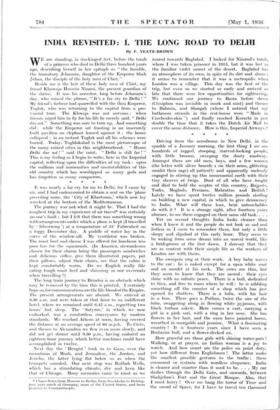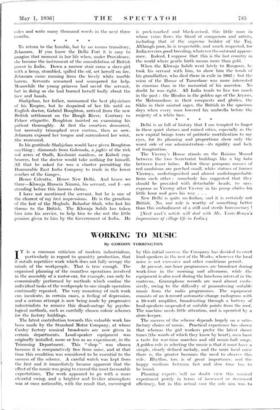INDIA REN ISITED: I. THE LONG ROAD TO DELHI
By F. YEATS-BROWN WE are standing, in stockinged feet, before the tomb of a princess who died in Delhi three hundred years ago, describing herself in her epitaph as " the humble, the transitory Jehanara, daughter of the Emperor Shah jehan, the disciple of the holy men of Chist."
Beside me is the heir of these holy men of Chist, my friend Khawaja Hussein Nizami, the present guardian of the shrine. It was his ancestor, long before Jehanara's day, who coined the phrase, " It's a far ery to Delhi ! " My friend's forbear had quarrelled with the then Emperor, Tuglak, who was returning to the capital from a pro- vincial tour. The Khwaja was not nervous : when friends urged him to fly for his life he merely said, " Delhi dur ast." Something was sure to turn up. And something did : while the Emperor sat feasting in an insecurely built pavilion an elephant leaned against it : the house collapsed : in an instant Tuglak and all his schemes were buried. Today, Tughlakalud is the most picturesque of the many ruined cities in this neighbourhood. " Hanoz Delhi dur ast " said the saint. " Delhi is still far ! " This is my feeling as I begin to write, here in the Imperial capital, reflecting upon the difficulties of my task : upon the millions and immensities and inscrutabilities of this old country which has worshipped so many gods and has forgotten so many conquerors.
* * *
It was nearly a far cry for me to Delhi, for I came by air, and I had endeavoured to obtain a seat on the 'plane preceding mine, the ' City of Khartoum,' which now lay wrecked at the bottom of the Mediterranean.
The journey was not what it might be. That I had the roughest trip in my experience of air travel* was certainly no one's fault ; but I felt that there was something wrong with arrangements under which a plane is kept (I travelled by Silverwing ') at a temperature of 55° Fahrenheit on a foggy December day. A puddle of water lay in the curve of the window-sill. My ventilator was broken. The roast beef and cheese I was offered for luncheon was poor fare for the squeamish. (In America, stewardesses chosen for their charm bring the passengers sandwiches and delicious coffee, give them illustrated papers, pat their pillows, adjust their chairs, see that the cabin is kept comfortably warm. Do we English really like eating tough roast beef and shivering in our overcoats when travelling ?) The long train journey to Brindisi is an obstacle which may be removed by the time this is printed. I certainly hope so, for conununications are the life-blood of the Empire. The present arrangements are absurd. We arrived at 3.30 a.m. and were taken at that hour to an indifferent hotel, where we remained until 6.45 a.m., regretting two hours' lost sleep. The Satyrus,' in which we now embarked, was a comfortless conveyance by modern standards. We reached Athens at noon, having covered the distance at an average speed of 86 m.p.h. To Crete, and thence to Alexandria we flew even more slowly, and did not get dinner until 9.30 p.m., having endured an eighteen-hour journey which better machines could have accomplished in twelve.
Next day the ' Hengist ' took us to Gaza, over the mountains of Moab, and Jerusalem, the Jordan, and Jericho, the latter lying flat below us as when the trumpets sounded. Our next stop was Rutbah Wells, which has a stimulating climate, dry and keen like that of Chicago. Many memories came to roost as we
* 1 have flown from Moscow to Berlin, from Stockholm to Helsing- fors, over much of Germany, most of the United States, and from Brindisi to Constantinople.
roared towards Baghdad. I looked for Nimrod's tomb, where I was taken prisoner in 1915, but it was lost in the familiar violet sunset of the desert. Baghdad has an atmosphere of its own, in spite of its dirt and slums : it seems to remember that it was a metropolis when London was a village. This day was the best of the trip, but even so we started so early and arrived so late that there were few opportunities for sightseeing. We continued our journey to Basra before dawn (Ctesiphon was invisible in murk and mist) and thence to Bahrein, and Shargah (where I noticed that my bathroom utensils in the rest-house were " Made in Czechoslovakia ") and finally reached Karachi in just double the time that it takes the Dutch Air Mail to cover the same distance. How is this, Imperial Airways ?
Driving from the aerodrome in New Delhi, in the sparkle of a January morning, the first thing I see are hundreds of ragged, stooping, starved-looking people, with little brooms, sweeping the dusty roadway. Amongst them are old men, boys, and a few women (the latter with silver bracele' s on their arms, glittering amidst their rags) all patiently and apparently uselessly engaged in stirring up this immemorial earth with their tiny sheaves of twigs. Dust of all who have fought and died to hold the sceptre of this country, Rajputs, Turks, Moghuls; Persians, Mahrattas and British ! Lately we have spent twelve million pounds sterling on building a new capital, in which to give democracy to India. What will these lean, bent untouchables do with it ? It is a strange sight,, after fourteen years absence, to see them engaged on their same old task. . . .
Yet on second thoughts India looks cleaner than when I knew it and the people do not look as sad and listless as I seem to remember them, but only a little sleepy and slipshod at this early hour. They seem to be waking from some dream into an unreal world, like a bridegroom at the first dawn. I daresay that they are as content with their simple life as the workers of London are with theirs.
The sweepers sing at their work. A boy baby waves to the car : he is naked except for a open white coat and an amulet at his neck. The cows are thin, but they seem to know that they . are sacred : their eyes shine with an infinite peace. There is a bull, dedicated to Siva, and free to roam where he will : he is nibbling something off the counter of a shop which has just opened its shutters. There is a babu, with his hair in a bun. There goes a Pathan, twice the size of the babu, swaggering along in flowing white pyjamas, with black turban askew. Here comes a cart, carrying a girl in a pink sari, with a ring_ in her nose.. She has flowers in her hair, and the oxen. have painted horns, wreathed in marigolds and jasmine. What a fascinating country ! It is fourteen years since I have seen a Brahmini bull, and a flower-decked ox.
How graceful are those girls with shining water-pots ! Walking, or at prayer, an Indian woman is a joy to watch. And how smart are. the police on point duty, yet how different from Englishmen ! The latter make the smallest possible gestures to the traffic : these command or restrain with wordless eloquence. India is cleaner and smarter than it used to be. . . . My car dashes through the Delhi Gate, and onwards, between Shahjehan's Fort and the . Great Mosque. Alas, that I must hurry ! Over me hang the terror of Time and the sword of Space, for I have to travel ten thousand miles and write many thousand words in the next three months.
To return to the humble, but by no means transitory, Jehanara. If you know the Delhi Fort it is easy to imagine that moment in her life when, under Providence, she became the instrument of the consolidation of British power in India. Down a narrow stair came a slave-girt with a lanip, stumbled, spilled the oil, set herself on fire. Jehanara came running from the lovely white marble harem. Servants screamed and scampered for help. Meanwhile the young princess had saved the servant, but in doing so she had burned herself badly about the face and hands.
Shahjehan, her father, summoned the best physicians of his Empire; but he despaired of her life until an English doctor, Gabriel Boughton, arrived from the new British settlement on the Hoogli River. Contrary to Palace etiquette, Boughton insisted on examining his patient thoroughly. At first the courtiers demurred, but necessity triumphed over custom, then as now. Jehanara exposed her tongue and surrendered her wrist. She recovered.
In his gratitude Shahjehan would have given Boughton anything : diamonds from Golconda, a jaghir of the rich red acres of Oudh, Kashmiri maidens, or Kabuli cup- hearers, but the doctor would take nothing for himself. All that he asked for was a charter permitting the Honourable East India Company to trade in the lower reaches of the Ganges.
Hence Calcutta. Hence New Delhi. And hence. we three—Khwaja Hussein Nizami, his servant, and I—are standing before this famous shrine.
I have not mentioned the servant, but he is one of the clearest of my first impressions. He is the grandson of the last of the Moghuls, Bahadur Shah, who lost his throne to the British. The Khwaja Sahib has taken him into his service, to help him to eke out the little pension given to him by the Government of India. He is pock-marked and black-avised, this little man in whose veins flows the blood of conquerors and artists, including. that of the supreme builder of the Taj. Although poor, he is respectable, and much respected, for India reveres good breeding, whatever the outward appear- ance. Indeed, I suppose that this is the last country in the World where gentle birth means more than gold. - When the Khwaja Sahib went lately to Rangoon, he took his servant with him, to show him the tomb of his grandfather, who died there in exile in 1862 ; but the scion of the House of Tamerlane was more interested in cinemas than in the memorial of his ancestor. No doubt he was right. All India tends to live too much in the past : the Hindus in the golden age of the Aryans, the Mahomedans in their conquests and glories, the Sikhs in their sainted sages, the British in the spacious days when every man lowered his umbrella before the majesty of a white face. * * * * Delhi is so full of history that I am tempted to linger in these quiet shrines and ruined cities, especially as the new capital brings tears of patriotic mortification to my eyes, for its planning and proportions show only the worst side of our administration—its rigidity and lack of imagination.
The Viceroy's House stands on the Raisina Mound between the two Secretariat buildings like a big babu between lesser babas. Below these pompous nue,scs of red sandstone are perched small, white statues of former Viceroys, undistinguished and almost undistinguishable from each other : somebody has suggested that they should be provided with detachable heads, to save expense as Viceroy after Viceroy in his pomp abides his little hour and goes his way . . .
New Delhi is quite tai-Indian, and it is certainly not British: No, our rule is worthy of something better than this embodiment of a stiff and sterile bureaucracy [Next week's article will deal with Mr. Yeats-Brown's impressions of village life in India.)















































 Previous page
Previous page